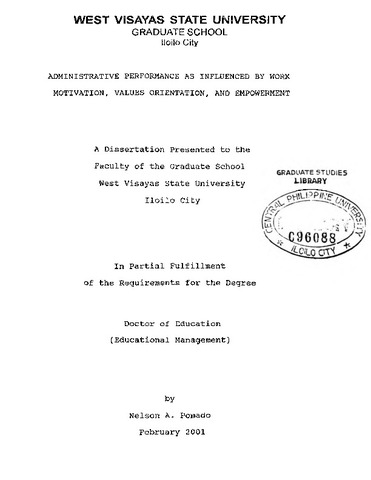Administrative performance as influenced by work motivation, values orientation, and empowerment
| dc.contributor.adviser | Abioda, Luis A. | |
| dc.contributor.author | Pomado, Nelson A. | |
| dc.coverage.spatial | Iloilo | en_US |
| dc.date.accessioned | 2021-06-09T08:20:16Z | |
| dc.date.available | 2021-06-09T08:20:16Z | |
| dc.date.issued | 2001-02 | |
| dc.identifier.citation | Pomado, N. A. (2001). Administrative performance as influenced by work motivation, values orientation, and empowerment (Unpublished Doctoral dissertation). West Visayas State University, Iloilo City. | en_US |
| dc.identifier.uri | https://hdl.handle.net/20.500.12852/1000 | |
| dc.description | Abstract only | en_US |
| dc.description.abstract | This study ascertained the influence of work motivation, values orientation, and empowerment on the administrators' performance. Conducted in November 2000, this descriptive- correlational research involved as participants the 101 randomly selected administrators in private educational institutions in Iloilo City. Four published standardized instruments were used to gather the data— the Steers and Braunstein's Work Motivation Questionnaire (1976, in Robbins, 1993); Rokeach's Values Survey (1973); Kolb, Osland, and Rubins' Empowerment Opportunities Questionnaire (1995); and the UPLB's Rating Scale for Higher Education Administrators (Abies, 1996). Statistics used were the means and standard deviations, the t-test for independent samples, the One-Way Analysis of Variance, the Pearson's r, and the Stepwise Multiple Regression Analysis. Significance level for inferential tests was set at .05. Study results revealed that the administrators had "achievement" as their dominant work motivation, "personal-competence" as their values orientation, "high" level of empowerment, and "very satisfactory" administrative performance. The administrators differed significantly in their work motivation when grouped as to faculty size and academic rank; values orientation when grouped as to school type and accreditation status; empowerment when grouped as to age, specialization, number of dependents, school type, academic rank, and accreditation status; and administrative performance when grouped as to number of dependents and academic rank. Teaching experience and faculty size were significant predictors of the administrators' work motivation; school type for their values orientation; age, number of dependents, and administrative experience for their empowerment; and educational attainment and number of dependents for their administrative performance. The administrators' empowerment and performance were positively and significantly correlated. | en_US |
| dc.format.extent | xvi, 333 leaves | en_US |
| dc.language.iso | en | en_US |
| dc.rights | Attribution-NonCommercial-NoDerivs 3.0 Philippines | * |
| dc.rights.uri | http://creativecommons.org/licenses/by-nc-nd/3.0/ph/ | * |
| dc.subject.ddc | GSL Theses 378.242 P77 | en_US |
| dc.subject.lcsh | School administrators | en_US |
| dc.subject.lcsh | Motivation (Psychology) | en_US |
| dc.subject.lcsh | Employee motivation | en_US |
| dc.subject.lcsh | Employee empowerment | en_US |
| dc.subject.lcsh | Power (Social sciences) | en_US |
| dc.subject.lcsh | Social values | en_US |
| dc.subject.lcsh | Performance | en_US |
| dc.subject.lcsh | Philippines--Iloilo | en_US |
| dc.title | Administrative performance as influenced by work motivation, values orientation, and empowerment | en_US |
| dc.type | Dissertation | en_US |
| dc.description.bibliographicalreferences | Includes bibliographical references | en_US |
| dc.contributor.chair | Abioda, Luis A. | |
| dc.contributor.committeemember | Andora, Henry J. | |
| dc.contributor.committeemember | Cabag, Ramon C. | |
| dc.contributor.committeemember | Ticao, Eda C. | |
| dc.contributor.committeemember | Trompeta, Grace P. | |
| dc.contributor.department | School of Graduate Studies | en_US |
| dc.description.degree | Master of Education major in Educational Management | en_US |
이 항목의 파일
This item appears in the following Collection(s)
-
Dissertations [6]



